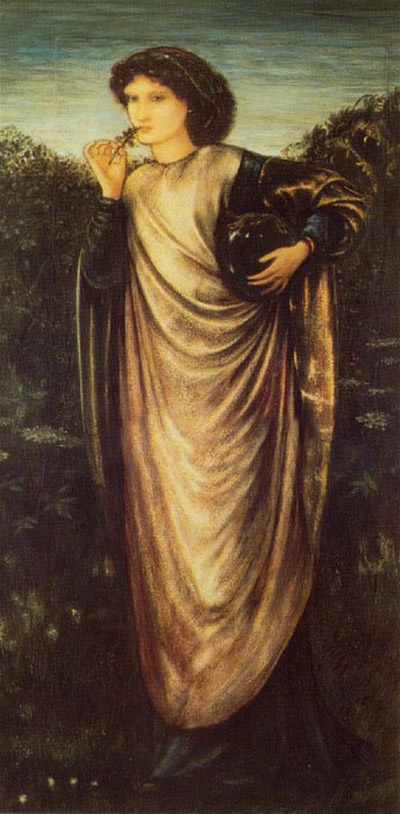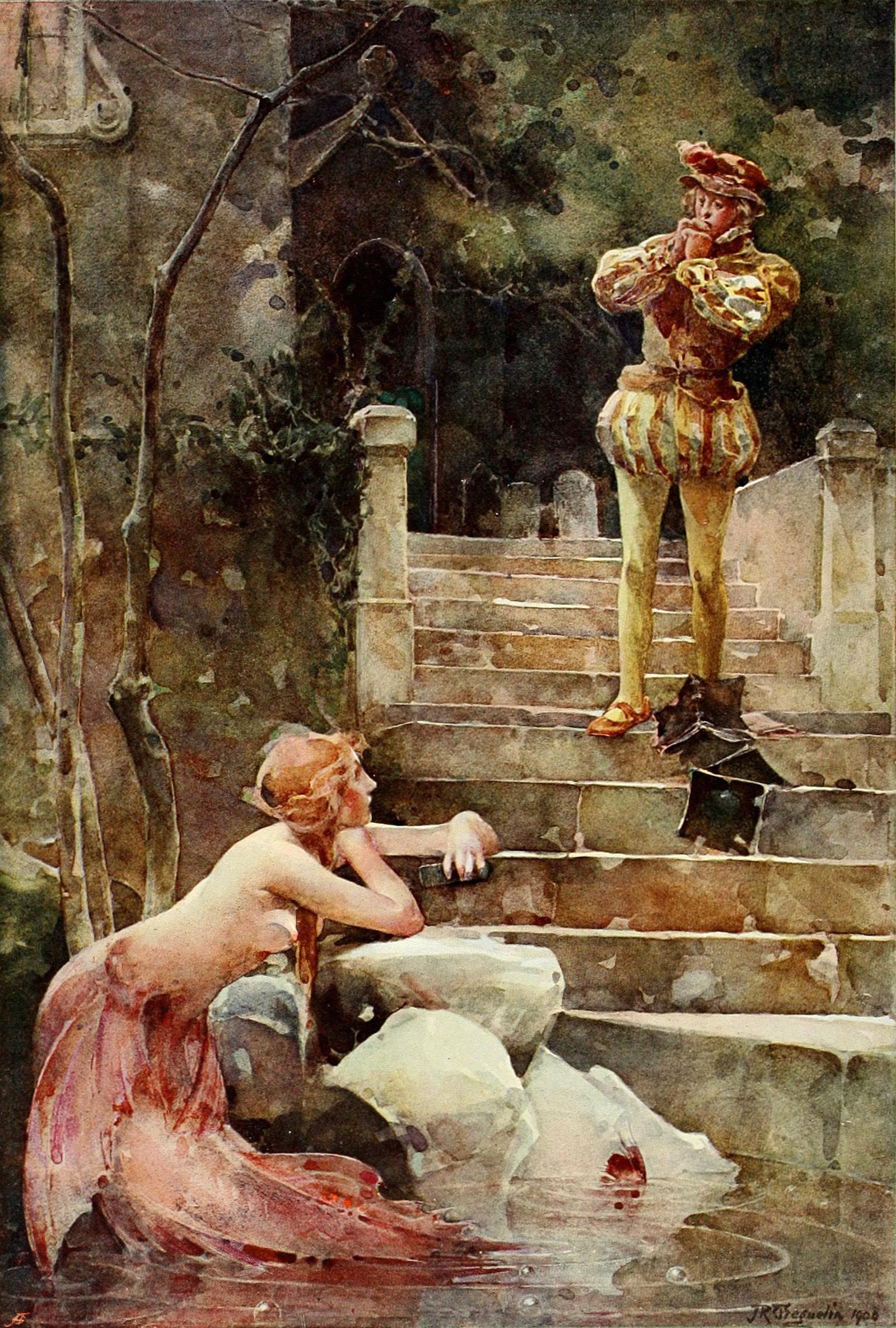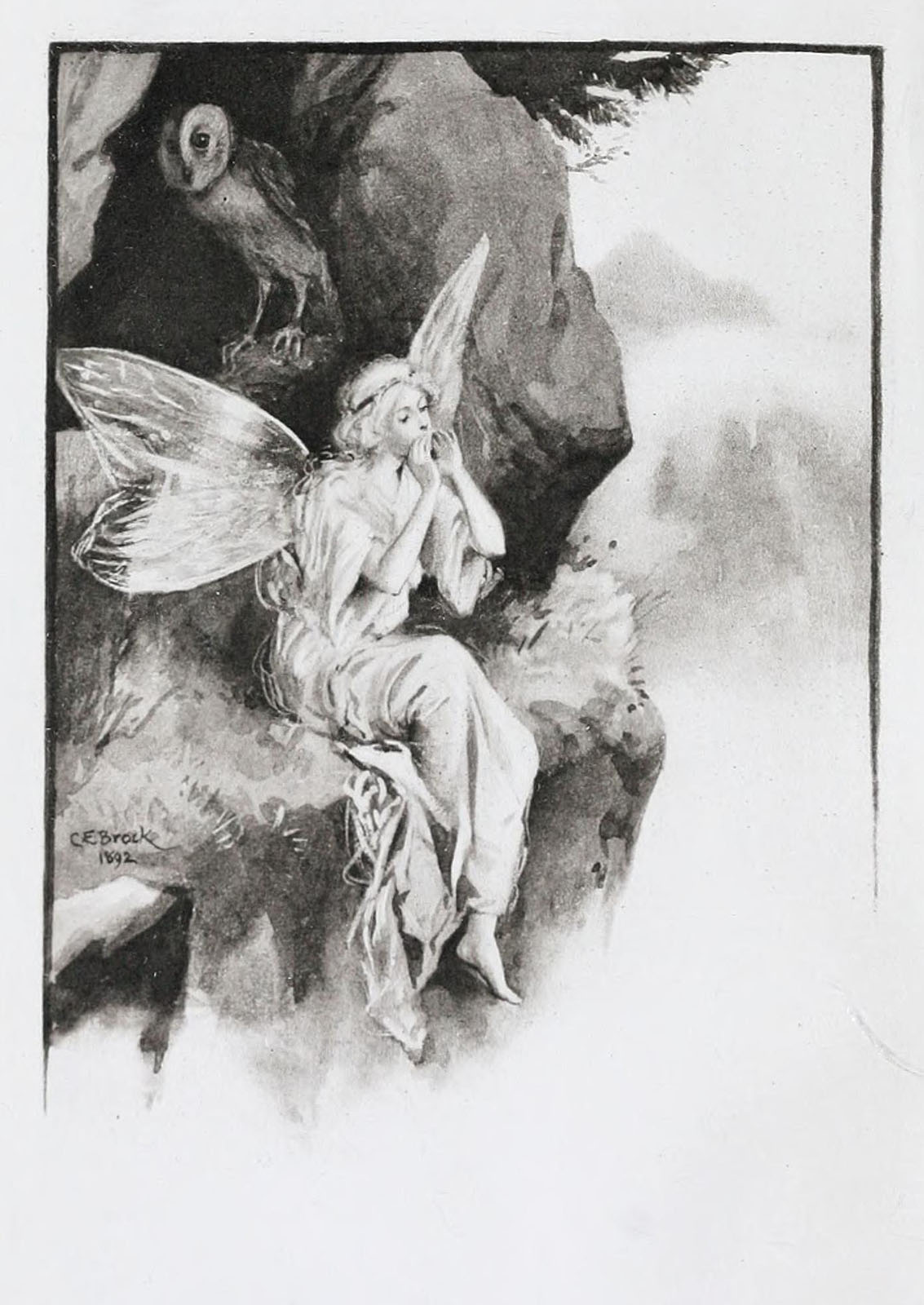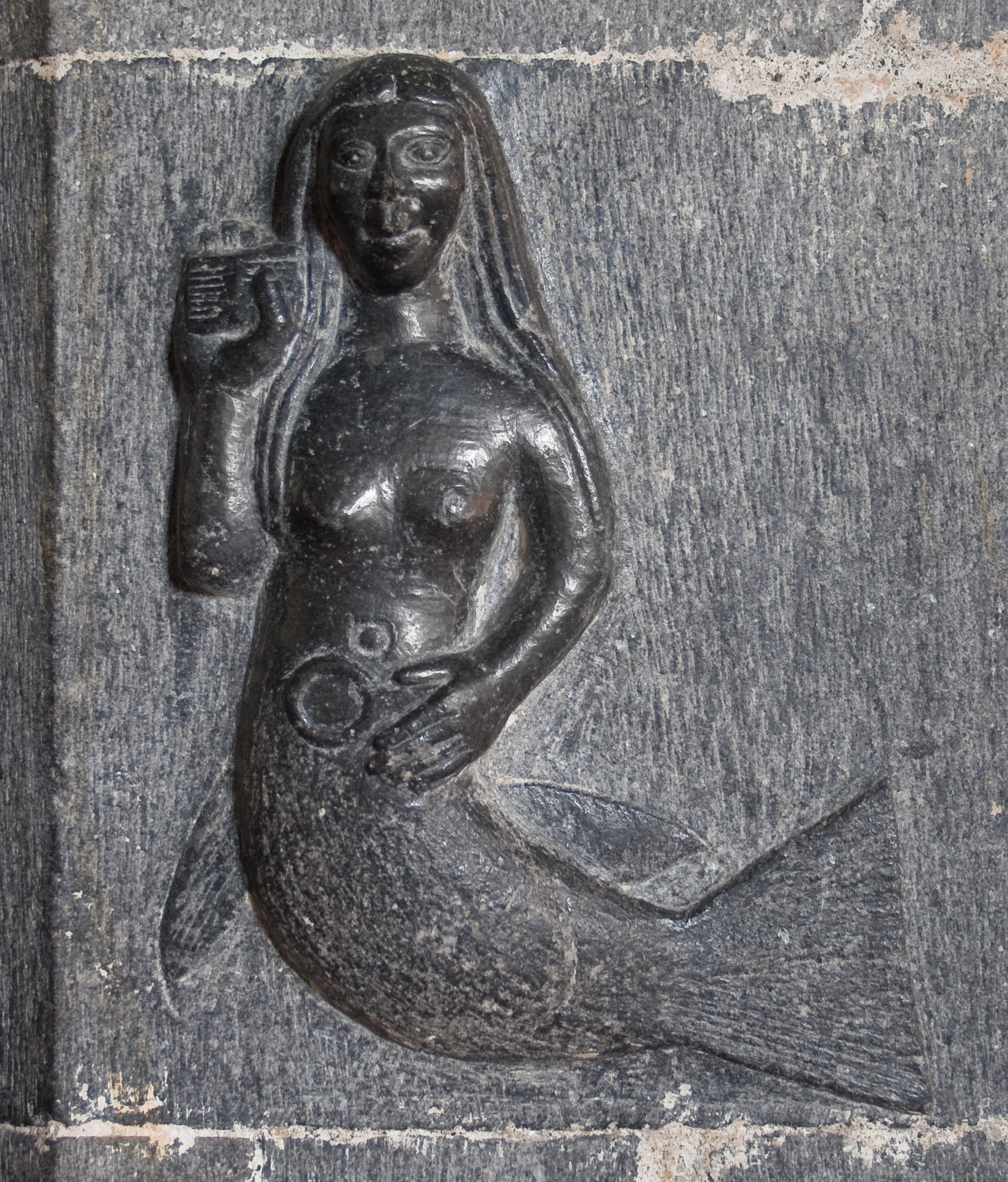|
Morgens
Morgens, morgans, or mari-morgans are Welsh and Breton water spirits that drown men. Etymology The name may derive from Mori-genos or Mori-gena, meaning "sea-born. The name has also been rendered as Muri-gena or Murigen. The name may also be cognate with the Irish ''Muirgen'', an alternate name of Lí Ban, a princess who was transformed into a mermaid when her city was flooded. The Cornish term for a mermaid is usually ''Morvoren'', as in the Mermaid of Zennor. Welsh and English legend The oldest occurrence of the name is in Geoffrey of Monmouth's ''Vita Merlini'', where the ruler of Avalon is referred to as "Morgen". As such, the origin of Morgan le Fay may be connected to these Breton mythology, Breton myths. The medievalist Lucy Allen Paton argues against this, stating that the Welsh name Morgen was pronounced "Morien" in the twelfth century, and that aside from living on an island, Morgan le Fay was not associated with the sea until later literature. Controversial Englis ... [...More Info...] [...Related Items...] OR: [Wikipedia] [Google] [Baidu] |
Welsh Mythology
Welsh mythology (also commonly known as ''Y Chwedlau'', meaning "The Legends") consists of both folk traditions developed in Wales, and traditions developed by the Celtic Britons elsewhere before the end of the first millennium. As in most of the predominantly oral societies Celtic mythology and history were recorded orally by specialists such as druids (). This oral record has been lost or altered as a result of outside contact and invasion over the years. Much of this altered mythology and history is preserved in Medieval Welsh literature, medieval Welsh manuscripts, which include the Red Book of Hergest, the White Book of Rhydderch, the Book of Aneirin and the Book of Taliesin. Other works connected to Welsh mythology include the ninth-century Latin historical compilation ''Historia Brittonum'' ("History of the Britons") and Geoffrey of Monmouth's twelfth-century Latin chronicle ''Historia Regum Britanniae'' ("History of the Kings of Britain"), as well as later Welsh folklore, ... [...More Info...] [...Related Items...] OR: [Wikipedia] [Google] [Baidu] |
Morgan Le Fay
Morgan le Fay (; Welsh language, Welsh and Cornish language, Cornish: Morgen; with ''le Fay'' being garbled French language, French ''la Fée'', thus meaning 'Morgan the Fairy'), alternatively known as Morgan[n]a, Morgain[a/e], Morgant[e], Morg[a]ne, Morgayn[e], Morgein[e], and Morgue[in] among other names and spellings, is a powerful and ambiguous Magician (fantasy), enchantress from the legend of King Arthur, in which most often she and he are siblings. Early appearances of Morgan in Arthurian literature do not elaborate her character beyond her role as a goddess, a fairy , fay, a Witchcraft , witch, or a sorceress, generally benevolent and connected to Arthur as his magical saviour and protector. Her prominence increased as the legend of Arthur developed over time, as did her moral ambivalence, and in some texts there is an evolutionary transformation of her to an antagonist, particularly as portrayed in cyclical prose such as the ''Lancelot-Grail'' and the Post-Vulgate Cyc ... [...More Info...] [...Related Items...] OR: [Wikipedia] [Google] [Baidu] |
Breton Mythology
Breton mythology is the mythology or corpus of explanatory and heroic tales originating in Brittany. The Bretons are the descendants of insular Britons who settled in Brittany from at least the third century. While the Britons were already Christianised in this era, the migrant population maintained an ancient Celtic mythos, similar to those of Wales and Cornwall. Breton mythology has many gods and mythical creatures specifically associated with nature cults. In this tradition of gods and creatures rooted in nature, there exist traces of certain Breton Catholic saints. * Ankou * Bugul Noz * Fions * Iannic-ann-ôd * Jetins * Korrigan * Cannard Noz * March Malaen * Morgens * Morvan, legendary chief of the Viscounty of Léon * Morvarc'h * Tadig Kozh (Placide Guillermic) * Tréo-Fall * Ys See also * Cornish mythology * Matter of Britain * Mythology in France * Welsh folklore * Welsh mythology Welsh mythology (also commonly known as ''Y Chwedlau'', meaning "T ... [...More Info...] [...Related Items...] OR: [Wikipedia] [Google] [Baidu] |
Mary, Mother Of Jesus
Mary was a first-century Jewish woman of Nazareth, the wife of Saint Joseph, Joseph and the mother of Jesus. She is an important figure of Christianity, venerated under titles of Mary, mother of Jesus, various titles such as Perpetual virginity of Mary, virgin or Queen of Heaven, queen, many of them mentioned in the Litany of Loreto. The Eastern Orthodox Church, Eastern and Oriental Orthodox, Catholic, Anglican, Methodist, Reformed Christianity, Reformed, Baptist, and Lutheran churches believe that Mary, as mother of Jesus, is the Theotokos, Mother of God. The Church of the East historically regarded her as Christotokos, a term still used in Assyrian Church of the East liturgy. Other Protestant views on Mary vary, with some holding her to have lesser status. She has the Mary in Islam, highest position in Islam among all women and is mentioned numerous times in the Quran, including in a chapter Maryam (surah), named after her.Jestice, Phyllis G. ''Holy people of the world: a cros ... [...More Info...] [...Related Items...] OR: [Wikipedia] [Google] [Baidu] |
Mermaid Of Zennor
The ''Mermaid of Zennor'' () is a Cornish folk tale which originates in the village of Zennor. The legend tells the story of a mysterious woman who occasionally attended the parish church of Zennor; a young man followed her home one day, and neither were seen again. One Sunday, a mermaid appeared to a group of local sailors, asking that they raise their anchor to let her enter her home, and the villagers concluded that she was the same woman who had attended their church. The legend is associated with a carved bench-end in the church, which depicts a mermaid. Background Cornish folklore features numerous stories about merfolk, and decorative mermaid motifs are common in Cornish churches. In Cornish legend, mermaids hold spiritual symbolism, and are viewed more positively than in many other cultures. In the '' Ordinalia'', the dual nature of Christ is compared to that of a mermaid: "He might well be Half man and half God. Human is half the mermaid, Woman from the head to the h ... [...More Info...] [...Related Items...] OR: [Wikipedia] [Google] [Baidu] |
Mermaid
In folklore, a mermaid is an aquatic creature with the head and upper body of a female human and the tail of a fish. Mermaids appear in the folklore of many cultures worldwide, including Europe, Latin America, Asia, and Africa. Mermaids are sometimes associated with perilous events such as storms, shipwrecks, and drownings (cf. ). In other folk traditions (or sometimes within the same traditions), they can be benevolent or beneficent, bestowing boons or falling in love with humans. The male equivalent of the mermaid is the merman, also a familiar figure in folklore and heraldry. Although traditions about and reported sightings of mermen are less common than those of mermaids, they are in folklore generally assumed to co-exist with their female counterparts. The male and the female collectively are sometimes referred to as merfolk or merpeople. The Western concept of mermaids as beautiful, seductive singers may have been influenced by the sirens of Greek mythology, which w ... [...More Info...] [...Related Items...] OR: [Wikipedia] [Google] [Baidu] |
Welsh Legendary Creatures
Welsh may refer to: Related to Wales * Welsh, of or about Wales * Welsh language, spoken in Wales * Welsh people, an ethnic group native to Wales Places * Welsh, Arkansas, U.S. * Welsh, Louisiana, U.S. * Welsh, Ohio, U.S. * Welsh Basin, during the Cambrian, Ordovician and Silurian geological periods Other uses * Welsh (surname), including a list of people with the name * Welsh pig, a breed of domestic pig See also * * * Welch (other) * Welsch Welsch may refer to: * Georg Hieronymus Welsch (1624–1677), German physician * Gottfried Welsch (1618–1690), German physician * Heinrich Welsch (1888–1976), Saarlandic politician * Henry Welsch (1921–1996), American football and basebal ..., a surname {{Disambiguation Language and nationality disambiguation pages ... [...More Info...] [...Related Items...] OR: [Wikipedia] [Google] [Baidu] |
Fairies
A fairy (also called fay, fae, fae folk, fey, fair folk, or faerie) is a type of mythical being or legendary creature, generally described as anthropomorphism, anthropomorphic, found in the folklore of multiple European cultures (including Celtic mythology, Celtic, Slavic paganism, Slavic, Germanic folklore, Germanic, and French folklore, French folklore), a form of Supernatural#Spirit, spirit, often with metaphysical, supernatural, or preternatural qualities. Myths and stories about fairies do not have a single origin but are rather a collection of folk beliefs from disparate sources. Various folk theories about the origins of fairies include casting them as either demoted angels or demons in a Christian mythology, Christian tradition, as deities in Paganism, Pagan belief systems, as Spirit (supernatural entity), spirits of the dead, as Prehistory, prehistoric precursors to humans, or as spirits of nature. The label of ''fairy'' has at times applied only to specific Magic (su ... [...More Info...] [...Related Items...] OR: [Wikipedia] [Google] [Baidu] |
Breton Legendary Creatures
Breton most often refers to: *anything associated with Brittany, and generally ** Breton people **Breton language, a Southwestern Brittonic Celtic language of the Indo-European language family, spoken in Brittany ** Breton (horse), a breed **Galette or Breton galette or crêpe, a thin buckwheat flour pancake popular in Brittany ** Breton (hat) headgear with upturned brim, said to be based on designs once worn by Breton agricultural workers Breton may also refer to: * Breton (surname) * Breton (band), a South London-based music group *Breton (Elder Scrolls), a race in ''The Elder Scrolls'' game series who are descendants of men and Elves *Breton, an alternative name for these wine grapes: ** Cabernet Franc ** Béquignol noir * Breton (company) * Breton, Alberta, village in Alberta, Canada * Cape Breton An island occupying roughly the northern fifth of Nova Scotia, Canada See also *''Bretonne'', 2010 album by Nolwenn Leroy *Briton (other) A Briton is a national or nati ... [...More Info...] [...Related Items...] OR: [Wikipedia] [Google] [Baidu] |
Merrow
Merrow (from Irish language, Irish ', Middle Irish ' or ') is a mermaid or merman in Irish folklore. The term is anglicised from the Irish word murúch. The merrows supposedly require a magical cap (; anglicised: #Cohuleen druith, cohuleen druith) in order to travel between deep water and dry land. Overview The term appears in two tales set in Ireland published in the 19th century: "The Lady of Gollerus, Lady of Gollerus", where a green-haired merrow weds a local County Kerry, Kerry man who deprives her of the "magical red cap" ('); and "The Soul Cages (story), The Soul Cages" where a green-bodied grotesque male merrow entertains a fisherman at his home under the sea. These tales with commentary were first published in T. C. Croker's ''Fairy Legends'' (1828). William Butler Yeats and others writing on the subject borrowed heavily from this work. "The Soul Cages" turned out not to be a genuine folktale, but rather a piece of fiction fabricated by Thomas Keightley. A number of ... [...More Info...] [...Related Items...] OR: [Wikipedia] [Google] [Baidu] |
Siren (mythology)
In Greek mythology, sirens () are female humanlike beings with alluring voices; they appear in a scene in the ''Odyssey'' in which Odysseus saves his crew's lives. Roman poets place them on some small islands called Sirenum scopuli. In some later, rationalized traditions, the literal geography of the "flowery" island of Anthemoessa, or Anthemusa, is fixed: sometimes on Cape Pelorum and at others in the islands known as the Sirenuse, near Paestum, or in Capreae. All such locations were surrounded by cliffs and rocks. Sirens continued to be used as a symbol of the dangerous temptation embodied by women regularly throughout Christian art of the medieval era. "Siren" can also be used as a slang term for a woman considered both very attractive and dangerous. Nomenclature The etymology of the name is contested. Robert S. P. Beekes has suggested a Pre-Greek origin. Others connect the name to σειρά (''seirá'', "rope, cord") and εἴρω (''eírō'', "to tie, join, faste ... [...More Info...] [...Related Items...] OR: [Wikipedia] [Google] [Baidu] |







